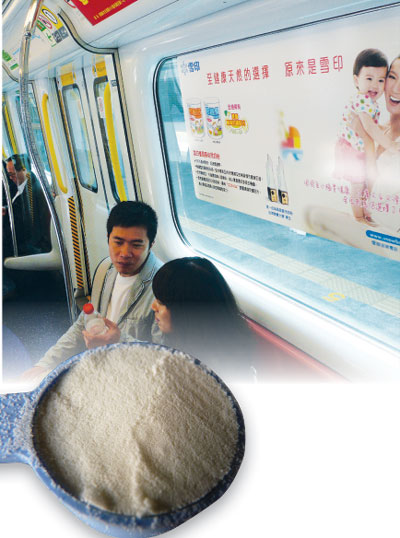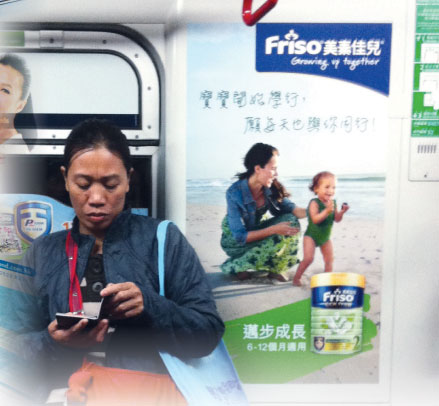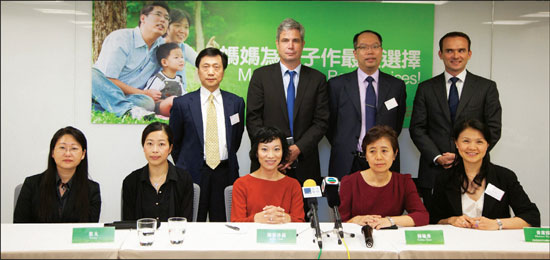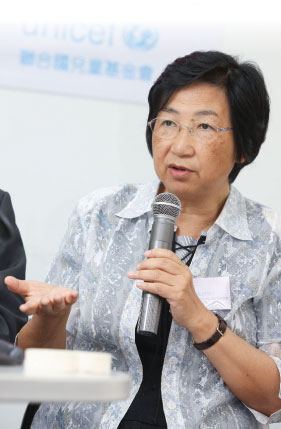Food for thought
Updated: 2012-12-05 07:02
By Hazel Knowles(HK Edition)
|
|||||||||
|
Milk formula manufacturers believe marketing and promotions are helpful in getting information about baby nutrition and feeding to parents and caregivers. All photos Provided to China Daily |
|
Advertisements like this one on the MTR for baby follow-up formula milk would not be allowed under the new voluntary code on marketing drafted by a working group under the Department of Health. |
|
Clarence Chung (back, 3rd left), president of the The Hong Kong Infant and Young Child Nutrition Association, is pictured with members of the association and supporting mothers. Chung believes a voluntary code controlling the marketing of formula milk and infant food will leave many parents without the information they need to make the right choice. |
A draft code aimed at regulating the marketing of baby food and formula milk has been applauded by international and local groups. But not everyone is impressed with manufacturers, claiming it will confuse mothers and restrict the free flow of information. Hazel Knowles reports.
The picture of the smiling mother playing with her toddler on a sandy beach dominates the side of the MTR carriage traveling the Island Line. She looks blissfully happy. Her daughter glows with health.
In the foreground sits the product being advertised in this heart-warming scene, a blue and gold can of follow-up formula milk.
It is the type of advertisement people encounter several times a day - in MTR carriages, on billboards along escalators and at intervals on the walls of public walkways.
It's an image that soon may disappear from Hong Kong if new voluntary regulations aimed at curbing the marketing of baby food and formula milk are put into action.
Under a set of draft regulations currently the subject of public consultation, marketing or promotion of any formula milk aimed at newborns to 36 month-olds will be banned. The same will apply to baby foods and baby feeding products such as bottles and teats.
The code - called the Hong Kong Code of Marketing and Quality of Formula Milk and Related Products, and Food Products for Infants and Young Children - will also prevent manufacturers from producing educational materials about breastfeeding and feeding for mothers. Similarly manufacturers will be banned from sponsoring educational functions or competitions such as baby crawling competitions or mothers' clubs.
It will also forbid them from handing out free samples at health care facilities and restrict information and health claims on labels to what can be scientifically proven.
Aimed at protecting the practice of breastfeeding in the city, the drafting of the code has been applauded by international and local groups which support breastfeeding.
But manufacturers of formula milk and baby food are not happy, claiming the code contradicts Hong Kong's open, free market economy and will leave parents confused and without the information they need to make informed choices.
The code was unveiled in October by a special task force set up in 2010 to look at the issue by the Department of Health.
It is designed to bring Hong Kong in line with many other countries which already have regulations controlling the marketing of formula milk and the International Code of Marketing of Breast milk Substitutes, adopted by the World Health Assembly in 1981.
For Patricia Ip Lai-sheung the Hong Kong draft code is a welcome step towards making the city more baby friendly - but one which has been too long in coming.
Ip is the chairwoman of the Baby Friendly Hospital Initiative Hong Kong Association, which was set up by UNICEF in 1994 with the aim of promoting breastfeeding and the international code in the city which still lags behind neighboring countries in breastfeeding rates.
In a World Breastfeeding Trend Initiative assessment carried out earlier this year by the association, Hong Kong scored 37 out of a total score of 150, far lower than the Chinese mainland, the Philippines, Thailand and Korea.
An annual survey by the association found that in 2011, 83.1 percent of new mothers were breastfeeding when they left hospital, an increase of 4.1 percent in 2010. However, the rate plummets within the first few months; with many mothers abandoning breastfeeding before their babies reach six months.
Earlier this year, the Hospital Authority found that of 2,547 breastfeeding mothers discharged from hospital, only 1,860 were still breastfeeding after one month, of whom only 616 were breastfeeding exclusively.
|
The draft code aims to limit the marketing and promotional activities of formula milk and baby food manufacturers so parents will receive only factual, scientific and unbiased information on which to base their choices, says Patricia Ip, chairperson of the Hong Kong Baby Friendly Hospital Initiative Association. |
The World Health Organisation recommends exclusive breastfeeding for the first six months, followed by the addition of complementary food about that time and continued breastfeeding for up to two years and beyond.
Ip believes the aggressive marketing by milk formula companies is partly to blame for the drop and many mothers supplement breastmilk with formula milk because they believe it to be as good, if not better, than breastmilk.
Ip's support of the code is shared by the International Baby Food Action Network (IBFAN), a group set up to safeguard the health of babies and young children by promoting and supporting breastfeeding and the implementation of the international code.
"We think the drafters have done an excellent job," IBFAN's Yeong Joo Kean told China Daily.
"It is a comprehensive draft and they have considered all relevant angles and tailored the draft to fit Hong Kong's social and legislative framework.
"If the code is adopted in its current form, it will be ahead of codes adopted elsewhere. The draft gives effect to the International Code in its entirety as governments are required to do.
Yeong, the legal advisor of IBFAN's International Code Documentation Centre, which monitors the code and violations, and Ip, however, would have liked to see the code backed by legislation. At the moment it is only voluntary and companies who violate the code will receive only advisory letters and will not face penalties.
Ip would also like to see the Department of Health publicizing the names of companies which violate the code.
The optimism over the code is not shared by the Hong Kong Infant and Young Child Association - an alliance of six major formula milk and baby food manufacturers formed in May 2011.
The group stressed that it fully supported the WHO's recommendation that breastmilk was ideal for infants under six months, but said it was concerned the scope of the code covered food, formula, bottles and teats aimed at children beyond six months and up to 36 months.
Clarence Chung, president of the association, said restrictions on marketing should apply only to formula and feeding products for babies under six months, as is the case in many other countries.
He said restrictions on products for newborns to 36 month-olds would leave parents with little information about weaning with formula milk or baby food, but give them free access to promotional material from junk food producers.
"It is important that accurate information be provided for parents so they can decide what kind of food they should introduce to the diet of their babies or young child. We think it is important to continue to allow promotion and marketing of our products for 6-36 months," said Chung.
"The draft code prohibits manufacturers and distributors from talking about infant feeding as well as breastfeeding, but first time mothers may have questions about how to reconstitute products. Our member companies received hundreds of calls very month from mothers asking how to feed their babies and questions on the diet of their children.
"We are very concerned that the right information is given to parents and caregivers."
Chung is also general manager of Wyeth Nutrition, one of the founding companies of the association.
Chung said the association was also worried the code covered labeling as well as marketing practices. The association thinks the labeling standards may be confusing - adding labeling restrictions are not found in codes elsewhere in the world.
However the association's major concern, said Chung, was that the code was voluntary and not backed by legislation. This could create confusion for the consumer and an "uneven playing field" for the manufacturers.
"If certain companies join and others don't, the result would be chaotic. Consumers would not be able to compare labels," said Chung.
"Legislation is the right approach to ensure all the participants in the market follow and comply. To do something quickly which is not really able to protect the children's health is not beneficial to Hong Kong citizens."
Chung said the association had learned from its contact with mothers that the main reason for giving up breastfeeding was often the short maternity leave offered to them in the workplace, or because the public or working environment failed to provide them with the support they need such as providing nursing rooms.
"If we want to help mothers we should advocate that the stakeholders and the government work together to see what we can do to help women to breastfeed up to six months" said Chung.
The Department of Health denied the code restricted the flow of information saying it took a balanced and reasonable approach to the marketing of formula milk.
In a statement to the China Daily, a spokesperson said the code provided provisions to prevent parents from being overwhelmed by advertisements which are often exaggerated and carry claims not scientifically provable.
At the same time it ensured parents who wish to purchase formula milk could obtain factual product information through a number of easily accessible channels such as company websites, health care professionals and retailers.
In response to the manufacturers' association's claims that the code would contradict free trade in Hong Kong, the spokesperson said, "Hong Kong adopts a free trade policy. The implementation of the Hong Kong Code is for the purpose of protection of human health, particularly for infants and young children."
Ip is also adamant the code will not restrict the free flow of information for the consumer nor access to the products.
"Yes, the marketing is being restricted so there should be no advertisements of these products on television or in magazines or promotional activities such as mother and baby clubs. They (the manufacturers) will not be able to produce their booklets or pamphlets on infant feeding or sponsor activities.
"But parents can still get information on mother and child feeding from mother and child health centers, hospitals and health care workers.
"They will still be able to get the products and product information. The code does allow them to produce material for their products but this information has to be scientific and factual."
The manufacturers' push for legislation Ip described as a stalling tactic to delay implementation of the voluntary code.
IBFAN's Yeong Joo Kean agrees. "Law is the best option as it makes compliance mandatory but the law has to be strong one," she said.
"When industry pushes for law, they mean a "mini law" which won't be worth the paper it is written on and at this point I see it as no more than a delaying tactic.
"In this respect, a strong voluntary code is much better than a weak law. If there is an efficient system of oversight and companies are called to account for their excesses, a voluntary code can work."
(HK Edition 12/05/2012 page4)



